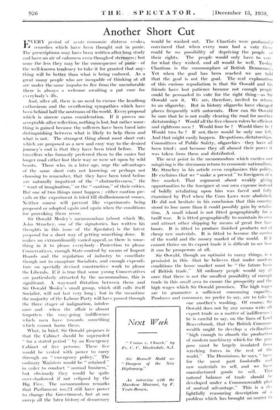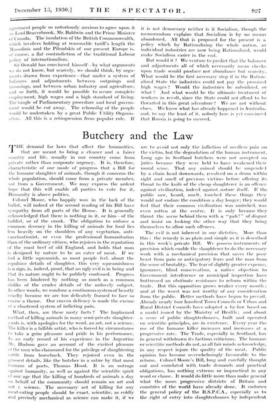Another Short Cut
14'VERY period of acute economic distress evokes -1.-a remedies which have been thought out in panic. The prescriptions may have been written after long study and have an air of calmness even though of sternness; but none the less they may be the consequence of panic—of the well-known tendency to take it for granted that any- thing will be better than what is being endured. As a great many people who are incapable of thinking at all are under the same impulse to flee from the unendurable there is always a welcome awaiting a pat cure for everybody's ills.
And, after all, there is no need to excuse the headlong enthusiasm and the overflowing sympathies which have been behind half the nostrums of the world. Every proposal which is sincere cams consideration. If it proves un- acceptable after reflection, nothing is lost, but rather some- thing is gained because the sufferers have been lured into distinguishing between what is likely to help them and what is not. The strangest thing about most short cuts which are proposed as it new and easy way to the desired
journeys end is that t have been tried before. The ravellers who formerly preferred them to the easier but longer road either lost their way or were set upon by wild beasts. Those who, in a later age, urge the advantages of the same short cuts not knowing, or perhaps not choosing to remember, that they have been tried before are naturally impatient of the " obstructiveness," the " want of imagination," or the " caution," of their critics. But one of two things must happen : either caution pre- vails or the experiment is tried till disillusionment conies. Neither course will prevent like experiments being proposed or adopted again and again when the conditions for provoking them recur.
Sir Oswald Mosley's memorandum (about which Mr.
■ Im Strachey, one of the signatories, has written his thonghts in this issue of the Spectator) is the latest proposal for a short way of getting something done. It makes an extraordinarily varied appeal, as there is some- thing in it to please everybody Protection to please Conservatives, enough State-control by means of Import• Boards and the regulation of industry to conciliate I bough not to enrapture Socialists, and enough expendi- ture on specially devised constructive work to please the Liberals. If it is true that some young Conservatives are particularly attracted by the memorandum, this is significant. :1. wayward flirtation between them and Sir Oswald Mosley's small group, which still calls itself Socialist, will not last very long ; but in the meantime t he majority of the Labour Party will have passed through the three stages tel indignation, intoler-
ance and when the affair is :ffinost forgotteit the casy-goi ng iuteltffercnet which uiten have t °wards something Irhich cannot harm them.
What, in brief, Sir Oswald proposes is that the Cabinet should be superseded '• for a stated period " by an Emergency Cabinet of live persons. These five would be vested with power to carry through an " emergency policy." The ordinary Ministers would be " retained " in order to conduct " normal business,- but obviously they would be quite over-shadowed if not eclipsed by the Big Five. The memorandum remarks that Parliament wo-,±1 still have power to change the Government, but at one sweep all the later history of democracy would be washed out. The Chartists were profouniffi- convinced that when every man had a vote theri, could be no possibility of depriving the people of their rights. The people would • only have to vote' for what they wished, and all would be well: To-day Chartism is the commonplace of British Demoerac;. Yet when the goal has been reached we are told that the goal is not the goal. The real explanatimi of this curious repudiation is that Sir Oswald and his friends have lost patience because not enough people could be persuaded to vote for the right thing—as Sir Oswald saw it. We are, therefore, invited to return to an oligarchy. But in history oligarchs have changed places frequently with autocrats. How call Sir Oswald be sure that he is not really clearing the road for another dictatorship ? Would all the five chosen 'rulers be efficient and righteous men ? Would four be ? Would three be ? Would two ffic ? If not, there would be oily one left. And that might easily happen. Despotisms, dictatorships. Committees of Public Safety, oligarchies—they have all been tried ; and because they all abused their power it was taken from them and distributed.
The next point in the memorandum which excites our misgiving is the strenuous return to economic nationalism. Mr. Strachey in his article even emphasizes this policy. He exclaims that we "make a present" to foreigners of it free market. That argument about weakly giving opportunities to the foreigner at our own expense instead of boldly retaliating upon him was faced and fully examined by Peel when the Corn Laws were abolished. He (lid not hesitate in his conclusion that this country stood to lose more than it could possibly gain by retalia- tion. A small island is not fitted geographically for it tariff war. It is fitted geographically to maintain its own and attract other shipping by means of great free har- bours. It is fitted to produce finished products out of cheap raw materials. It is fitted to become the carrier of the world and the money market of the world. If it cannot thrive on its export trade it is difficult to see how it can be prosperous at all.
Sir Oswald, though an optimist in many things, is a pessimist in this—that he believes that under modem conditions the home market must be " the future basis of British trade." All ordinary people would say at once that there is not the smallest possibility of enough trade in this small area to ensure the prosperity and the high wages which Sir Oswald promises. The high wages are to guarantee a sufficient consuming capacity. Producer and consumer, we prefer to say, are to take in one another's washing. Of course, Sir
Oswald does not by any means write off
export trade as a matter of indifference ; he is careful to say, on the lines of Lord Beaverbrook, that the British Conunon- wealth ought to develop a eivilizatimi "high enough to absorb the production of modern machinery which for the pur- pose must he largely insulated from wrecking forces in the rest of the world." The Dominions, he says, " have for the most part foodstuffs and raw materials to sell, and we base manufactured goods to sell. This natural balance of trade should be developed under a Commonwealth plan of . mutual advantage." This is a de- lightfully reassuring description of a problem which has brought nonearer to
agreement people so notoriously anxious to agree upon it as Lord Beaverbrook, Mr. Baldwin and the Prime Minister of Canada. The insulation of the British Commonwealth, which involves holding at reasonable tariff's length the 3Iussolinis and the Pilsudskis of our present Europe is, of course, a flat contradiction of the traditional Labour policy of internationalism.
Sir Oswald has convinced himself—by what arguments we do not know, but scarcely, we should think, by argu- ments drawn from experience—that under a system of balances and adjustments between outgoings and Mcomings, and between urban industry and agriculture, and so forth, it would be possible to secure complete employment; high wages and a high standard of living. The tangle of Parliamentary procedure and local govern- ment would be cut away. The rehousibg of the people would be undertaken by a great Public Utility Organis- ation. All this is a retrogression from popular rule. If
it is not democracy neither is it Socialism, though the memorandum explains that Socialism is by no means abandoned. All that is proposed for the present is a policy which by Rationalizing the whole nation, as individual industries are now being Rationalized, would make Socialism easier in the end.
But would it ? We venture to predict that the balances and adjustments all of which necessarily mean clucks upon trade would produce not abundance but scarcity. What would be the first necessary step if in the Ration- alized State the industries could not pay the promised high wages ? Would the industries be subsidized, or what ? And what would be the ultimate treatment of workers in revolt, since the State could not afford to be thwarted in this great adventure? We arc not without clues. We know what has already happened in Australia, and, to say the least of it, nobody here is yet convinced that Russia is going to succeed.















































 Previous page
Previous page